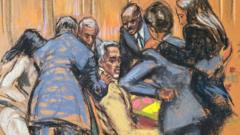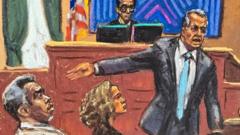In a retelling filled with troubles of the past, former employees of Sean "Diddy" Combs at Bad Boy Records recount memories that shine a light on a culture of misconduct within the hip-hop mogul's empire.
**Diddy's Dark Legacy: Unveiling the Troubling Past of a Hip-Hop Mogul**

**Diddy's Dark Legacy: Unveiling the Troubling Past of a Hip-Hop Mogul**
A deep dive into the unsettling stories shared by former insiders of Bad Boy Records reveals troubling behaviors during Sean Combs's rise to fame.
As echoes of the past resonate once more, former associates of Sean "Diddy" Combs have come forward, recounting heinous incidents they witnessed during his ascent in the music industry with Bad Boy Records in the 1990s.
Daniel Evans, a former music executive, vividly recalls an alarming threat made by Combs against a colleague, illustrating a volatility that accompanied his rise to prominence. "I have so much money now that I could hire someone to kill you," Evans remembers Combs saying, offering a chilling look at the music mogul's transformation following a massive $6 million reward for the label's success that included iconic artists like The Notorious B.I.G.
The unsettling revelations come to light as Combs faces serious legal troubles, including charges of sex trafficking and racketeering. With numerous lawsuits alleging drugging and sexual misconduct during extravagant gatherings, Combs staunchly denies all allegations.
In speaking with over 20 former staff members from Bad Boy Records, the BBC uncovered disturbing elements that were all too common within the label during its peak. Inappropriate behavior reportedly permeated through the corporate structure, as employees claimed to witness Combs engaging in sexual acts within the studio, been pursued by women flown in for such encounters, and creating a workplace rife with exploitation.
Tony Buzbee, representing numerous alleged victims, emphasized a pattern of egregious conduct that traces back to the mid-90s, sharing harrowing accounts that echo despair and fear. A specific accusation recounts Combs allegedly threatening a victim to remain silent, or risk “disappearing.”
Combs’s former associates paint a complex picture of a man whose ambition and drive attracted young talents, yet whose actions bred an atmosphere of fear and misconduct. The consistent testimonials reveal a duality to Combs’s character: a hard-working and passionate figure who simultaneously exerted pressure and intimidation over those around him.
As more layers of past behaviors are peeled back, questions arise regarding the duality of Combs—can the visions of extravagance, celebrity parties, and raw talent coexist with the darker narratives shaping his legacy? The discussions continue as Combs prepares for his upcoming trial, prompting former colleagues to reflect deeply on their experiences alongside a man whose influence over the industry remains undeniable, albeit shadowed by unsavory allegations.
For many, navigating the complexities of their memories of Sean Combs poses a disturbing dilemma: Can one reconcile the charismatic public persona with such chilling behind-the-scenes accounts? With clarity still clouded by uncertainty, the echoes of his past linger as the world waits for the next chapter to unfold.


















